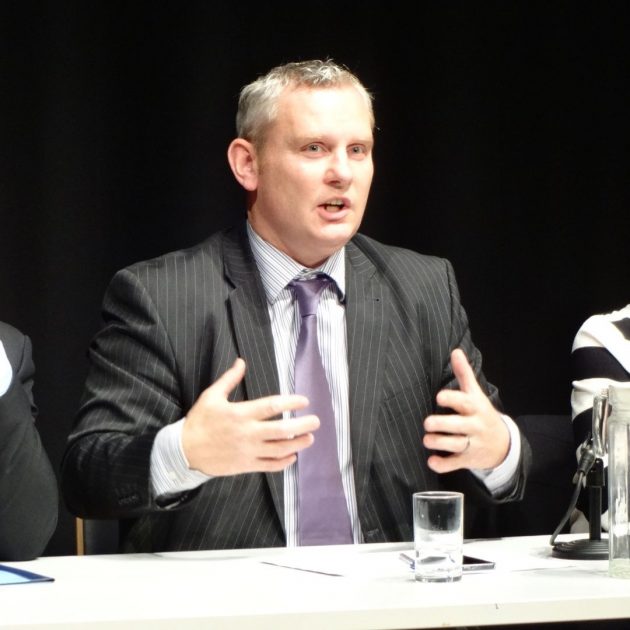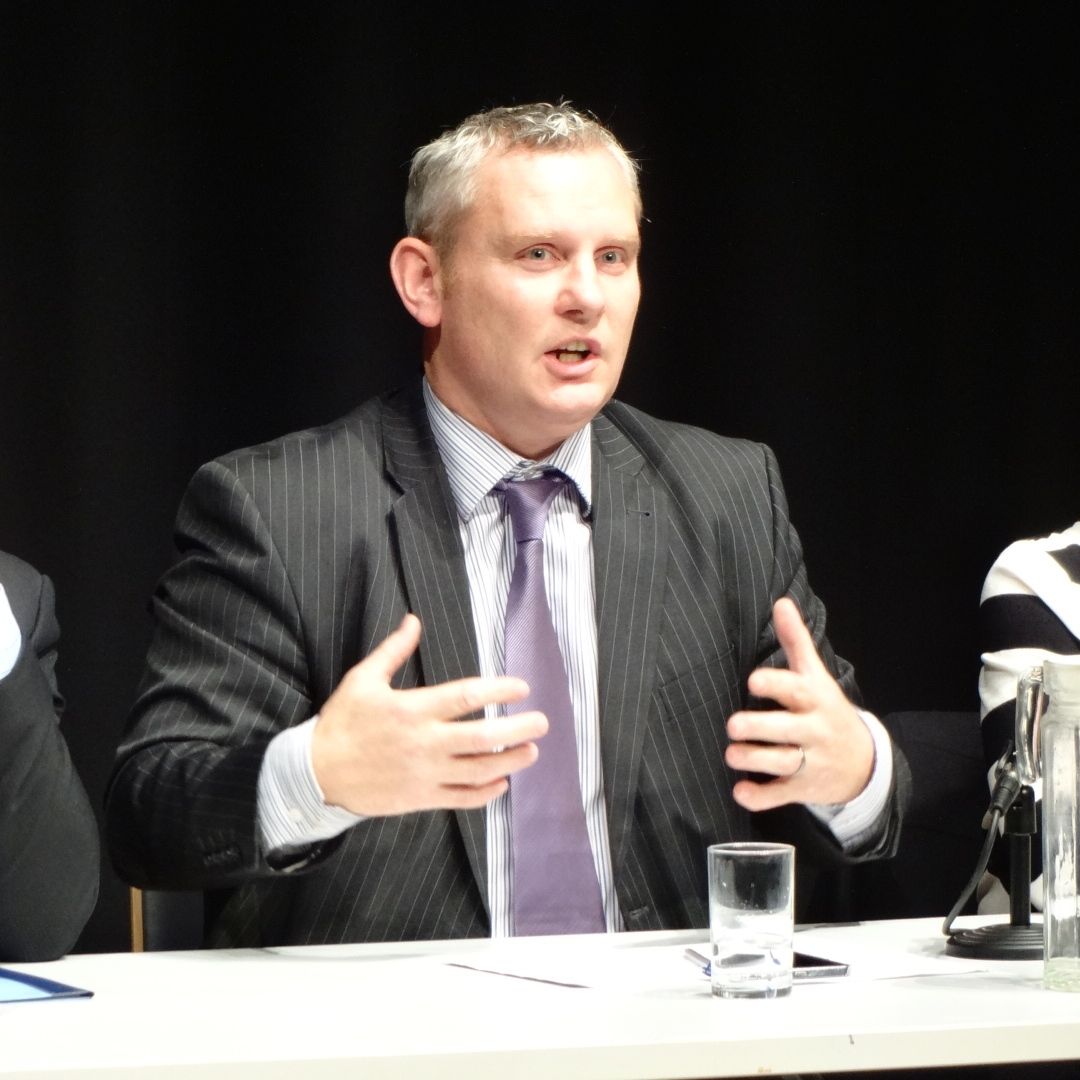 John McCallister may be ex-UUP and ex-NI21, but he’s not planning to be ex-politics. I spoke to the South Down independent unionist late last week. He’s rebuilding his profile and perhaps also his reputation after been seen as the person who pulled the plug on NI21 a day or two before the May 2014 elections. On top of “a fairly hefty workload of constituency work” he’s ploughing effort into a Private Members Bill to address Assembly and Executive Reform.
John McCallister may be ex-UUP and ex-NI21, but he’s not planning to be ex-politics. I spoke to the South Down independent unionist late last week. He’s rebuilding his profile and perhaps also his reputation after been seen as the person who pulled the plug on NI21 a day or two before the May 2014 elections. On top of “a fairly hefty workload of constituency work” he’s ploughing effort into a Private Members Bill to address Assembly and Executive Reform.
After “a fairly horrific few months dealing with stuff” he’s back “feeling re-energised” and “enjoying the politics”.
I can absolutely categorically tell you that I’m not planning to retire … probably my generation looks as if we’ll have to work to ninety to get our pension! I’m standing in South Down for the 2016 Assembly election …
I got probably more amendments in the education bill than anyone else, stuff that I’m passionate about around shared education, around community use of schools, kept making those arguments and persuading colleagues.
John says he’s “working hard on the ground for constituents, using the position as a member for South Down to ask difficult questions that [also] relate to South Down”.
Why in Banbridge is the spend for tourism for tourism smaller? Why are we not getting the capital investment in tourism from Invest NI that other areas have. It was £39,000 compared to £850,000 in Fermanagh and South Tyrone.
John is no longer under the large party umbrella of the UUP (not to forget NI21). He’ll be fighting South Down against the UUP and UKIP. With normally only two unionists elected to the Assembly from the constituency, isn’t he in a tight spot?
It would have been much easier and [more] comfortable to have stayed in the UUP, but I came out and resigned form the UUP because of unionist unity because that is fundamentally bad for politics, for Northern Ireland and actually you cannot have an opposition and unionist unity at the same time …
Yes, you’re right that I’m in a difficult position but I’m more confident now being out and about, speaking to people and the sheer frustration I’m getting on the ground off people. One of the biggest challenges I have, more than the UUP, UKIP or anyone else run against me, is apathy because people are fed up to the back teeth with Stormont quite frankly …
I want to talk about the issues that effect people, whether it’s road safety at a junction in Rathfriland; whether it’s the tourist economy and the tourism spend; whether it’s about single farm payments; whatever the issue happens to be.
On expenses:
If particularly like me you’re a single member in a large rural constituency, your mileage claim will be higher that if I was a member for East Belfast or somebody who can split a constituency in two effectively [with a party colleague]. If you have no party support you will likely run to the maximum in your office cost expenditure because you simply need support in both the weight of constituency work that we have and in either research or support in doing things like round an Education Bill that comes very quickly and you’ve to respond to it. You will need support …
Where I don’t have sympathy for is – for example – someone that doesn’t drive is claiming mileage, it’s a little hard for the public to have sympathy with that … I do think over the last few years around things like office rent with having independent valuation, any potential there has been pretty well clamped down.
On shrinking the number of MLAs:
If I got my Assembly and Executive Reform Bill passed … I wouldn’t be supportive of changing the numbers [of MLAs] until an Opposition had properly got established. The same argument we had in 1998 that you needed the numbers to get a government established. Bill White of LucidTalk ran some numbers – and I know they’re not an exact science – but you could effectively kill off an opposition before it even got going …
An early decrease in the number of MLAs might “end up almost replicating the failings of the old Stormont Parliament where you had one party in power but no opposition”, this time creating what some people might say is “a one party state with an orange wing and a green wing”.
Specifically what would John like his Private Members Bill to introduce?
Renaming OFMdFM to the Office of the First Ministers and looking at much more as a coordinating department rather than a department of government because it’s hugely dysfunctional in the way it’s operating.
Also one of the key changes from the Executive point of view would be to extend the length of time between elections and running d’Hondt to give you proper time to negotiate a Programme for Government with home headline budgets for that.
Tom Elliott’s big idea from a few years ago? [Ed – you mean his “game changer”?]
You would go further. Once you sign up to a Programme for Government the government would act effectively as one unit so you’ve effective cabinet government. This is what we don’t have at the minute. We have 11 autonomous government departments that unless they need legislation the don’t need the bigger players in. So Justice doesn’t have to engage with Health over how we deal with mental illness or the number of people in the Criminal Justice System. Education doesn’t have to deal with Health over early intervention.
John would also favour setting a minimum level of party strength – perhaps 15-18 members elected – before being allowed into the Executive.
He also favours running d’Hondt “as one piece”, no longer stopping after Executive ministers are nominated and restarting from scratch for committee chairs.
It slightly favours smaller parties but it gives you somewhere to go if you’re the leader of the SDLP. Instead of picking Minister of the Environment you can make the chair of the Health Committee. It also means that your opposition parties would have half or slightly more than half of the committee chairs.
Stormont reform is on the table at the current talks and John acknowledges that he briefed the “Secretary of State” very heavily on what I want to do. He gauges support from key players as varying from “definite interest” to “broad support for large parts of it”. Some of the changes are devolved matters; other need permission from SOS and some might need changes at Westminster.
I’m determined to do something to progress this agenda.
The way legislation works [is] once it goes into the Assembly you don’t have total control over it because you’re depending on larger parties. I can’t stop the DUP petition of concerning changing to the Office of the First Minsters. I can’t stop Sinn Féin and the SDLP maybe petition of concerning something else. And I can’t stop Jim Allister or anyone else tabling amendments and I welcome [that as] it’s one time that ordinary back bench members of the Assembly can effect change in Northern Ireland if they can get an amendment and support for it.
Just over a year ago, John McCallister spoke at the close of NI21’s first – and possibly last – party conference. Would he welcome NI21’s reform and resurrection as a political movement? Should another party come in and fill that space?
It’ll have to be something else because as I’m on record a number of times, it was the most toxic experience of my life. And in politics you can meet with all sorts of experiences, but for something to set that high accolade of the most toxic experience. There was something rotten to the very core of it … Something rotten I was fighting at every turn against.
John said that the tragedy of NI21 was that that type of politics “is badly needed” but the allegations against Basil “wrecked” the party and made it impossible to continue operating.
He senses that support for opposition has grown since he stood on the issue against Mike Nesbitt in the last UUP leadership election.
Asked if he would like to see more independent MLAs, John agrees and points to Dublin where there are currently 23 independent TDs in the Dáil (up from 14 in the 2011 election). He sees Claire Sugden as a “very capable independent unionist” and would like to see more people like that elected to the Assembly.
The contribution oddly enough from what’s affectionately known as “the naughty corner” from people like Jim Allister – though at times we fundamentally disagree on a large number of issues – but there is almost at times a camaraderie between Jim and Steven Agnew and David McNarry and Claire and myself that can say we might end up voting in different lobbies on different issues and sometimes the same but that makes an important contribution to the Northern Ireland Assembly and that’s only six or seven people.
That’s what we need to see extended. I would welcome very much a group of independent unionists, building that up around with a mindset around some shared values could make an incredible contribution to Northern Ireland politics. It’s what Northern Ireland badly needs. Unionist unity kills that. It drives nationalist unity and it drives us all into our tribal trenches and is very bad for Northern Ireland and very bad for the Union.
Alan Meban. Tweets as @alaninbelfast. Blogs about cinema and theatre over at Alan in Belfast. A freelancer who writes about, reports from, live-tweets and live-streams civic, academic and political events and conferences. He delivers social media training/coaching; produces podcasts and radio programmes; is a FactCheckNI director; a member of Ofcom’s Advisory Committee for Northern Ireland; and a member of the Corrymeela Community.
Discover more from Slugger O'Toole
Subscribe to get the latest posts to your email.
